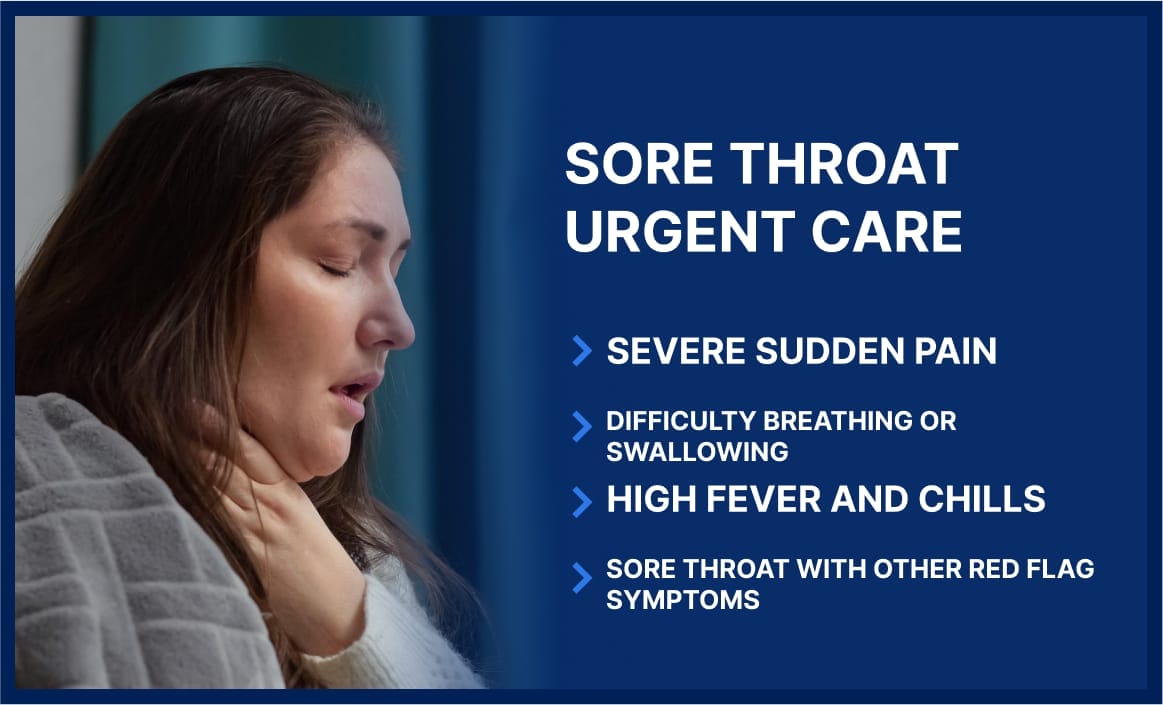A sore throat is a common ailment that can range from mild discomfort to a serious health concern, leaving many to wonder, “Should I go to urgent care for a sore throat?” While many cases can be treated at home, certain symptoms may require a visit to urgent care for prompt evaluation and treatment.
This guide will help you understand when professional care is necessary and explore effective remedies for relief.

Signs You Should Head to Urgent Care For a Sore Throat
Sore throats are common and often don’t need trips to your local urgent care center. However, there are some tell-tale signs when, in more severe cases, a trip to get it checked out is necessary.
a. Severe Sudden Pain
Do you have a sore throat with sudden severe pain? Strep throat or a peritonsillar abscess (a pocket of infected pus to the side and behind your tonsils) are possible causes. Both require medical attention to prevent serious complications. If you haven’t already, seek urgent care if you haven’t been treated for a sore throat and you have severe pain. Over-the-counter pain meds may help a sore throat, but if they don’t, you should get seen.
b. Difficulty Breathing or Swallowing
Can you breathe or swallow? If not, this is a medical emergency. A swollen throat or tonsils can block your airway or throat. A severe infection like epiglottitis can also block your airway and is life-threatening. If you’re having trouble breathing or difficulty swallowing, urgent care can provide quick attention or recommend an emergency room visit.
c. High Fever and Chills
A fever over 101°F is often a sign that your body is fighting off an infection that may require medication. With a sore throat, you could have strep throat, mono (infectious mononucleosis), or something more serious. If you have chills in addition to a fever, you should be evaluated by a doctor to determine the cause and get appropriate treatment.
d. Sore Throat with Other Red Flag Symptoms
A sore throat can mask other symptoms that are cause for concern. If you have a persistent sore throat with any of the following, seek urgent care:
- Joint pain: A typical sore throat can be a sign of a swollen lymph node. If you’re experiencing joint pain, it could be a sign of a viral infection that’s causing inflammation.
- Blood in your saliva: A severely irritated or infected throat can cause bloody saliva.
- Earache: If you have a sore throat and ear pain, you may have a secondary infection like tonsillitis (tonsil abscess) or otitis media (middle ear infection).

How Urgent Care Clinics Handle Sore Throats
If your sore throat persists or worsens despite home care, urgent care is a great resource to get you diagnosed and feeling better quickly. Urgent care centers are equipped to diagnose and treat sore throats quickly and effectively, and you won’t have to wait around for hours to be seen like you would in a busy emergency room or doctor’s office.
Diagnosis Process
When you visit urgent care for a sore throat, the diagnosis process typically begins with a discussion of your symptoms and medical history. The healthcare provider will perform a physical examination, checking for signs such as swollen lymph nodes, redness in the throat, or white patches on the tonsils.
To determine if a bacterial infection like strep throat is present, they may perform a throat swab, which provides quick results in most cases. This comprehensive approach ensures the root cause of your sore throat is identified accurately.
Treatments Available
Based on the diagnosis, urgent care professionals offer various treatments to address your sore throat effectively. If the sore throat is caused by a bacterial infection such as strep throat, they will prescribe antibiotic treatment to eliminate the infection.
For viral infections, they may recommend over-the-counter medications or pain relief options to manage symptoms while your body recovers. In more severe cases, such as abscesses or chronic issues, urgent care may provide referrals to specialists for further evaluation and treatment.
Benefits of Urgent Care
Urgent care centers provide a quick and efficient alternative to the emergency room for non-life-threatening conditions like a sore throat. They typically have shorter wait times, allowing you to receive timely treatment without the extended delays often experienced in an ER setting.
Additionally, urgent care facilities are equipped to handle a wide range of symptoms, ensuring you receive professional care tailored to your needs. For sore throats that require medical attention, urgent care offers a convenient and accessible solution.

Common Causes of Sore Throat and Their Treatments
A sore throat can have a variety of causes, and treatments depending on the cause. Identifying the cause is key to treating a sore throat effectively.
- Viral infections: Most sore throats are caused by viral infections, such as a cold, flu, or mononucleosis. Viral sore throats typically heal on their own within a few days and symptoms can be treated with over-the-counter medications, warm compresses to the throat, and plenty of rest. Throat lozenges and warm teas, such as tea with slippers and honey, can also provide comfort. Antibiotics are not effective for treating viral infections.
- Bacterial infections: Bacterial infections, such as strep throat, can be a sore throat caused by the Streptococcus bacteria, are another common cause of a sore throat. Strep throat often is accompanied by a fever, swollen and painful lymph nodes, and white patches on the tonsils. A doctor must prescribe antibiotics to treat a bacterial infection of the throat. If left untreated, a bacterial infection can cause serious complications.
- Allergies or irritants: Allergies to items like pollen, dust, or pet dander can irritate the throat, as can respiratory irritants like smoke, dry air, or strong chemicals. Treating an allergic reaction with antihistamines and avoiding allergens or irritants can help soothe a sore throat. Running a humidifier and using an air purifier can also help relieve irritation caused by dry air or allergens.
- Acid reflux: Gastroesophageal reflux disease (GERD) can cause stomach acid to flow up into the throat, irritating it and causing a sore or burning sensation. Changing your eating habits may help, such as avoiding foods that trigger the condition, eating smaller meals, and avoiding lying down after eating. Elevation of the head while sleeping and losing weight (if overweight) can also help. Over-the-counter medications like antacids or prescription medications like proton pump inhibitors can also be taken to help relieve symptoms.

Use Sore Throat 911 for Fast-Acting Relief
For those seeking immediate relief from sore throat discomfort, Sore Throat 911 offers a fast-acting and effective solution. Developed by a pharmacist with over a decade of experience creating innovative remedies, this topical roll-on is designed to penetrate deeply into the glands, addressing soreness at its source.
Sore Throat 911 uses a homeopathic formula containing potassium chloride, which helps alleviate symptoms like throat pain, sinus congestion, earache, and swollen glands. Safe for all ages, it provides a non-invasive way to manage discomfort quickly.
Many users report that it begins to promote gland drainage within just 30 minutes, with noticeable relief often occurring by the next morning when applied before bedtime.
Other At-Home Remedies to Relieve a Mild Sore Throat
For many cases of mild sore throat, simple at-home remedies can provide effective relief and support recovery. Rest is one of the most important steps; giving your body time to heal helps combat the underlying cause of your discomfort. Staying hydrated is equally crucial, as drinking plenty of water, herbal teas, or warm broths can soothe your throat and keep it moist, reducing irritation.
Another effective remedy is gargling with warm saltwater. This classic solution helps reduce swelling and flush out irritants or bacteria from the throat. Inhaling steam or using a humidifier can also ease dryness, especially if the sore throat is caused by dry air or seasonal changes. Warm, soothing liquids like honey and lemon tea can coat the throat, providing temporary relief and aiding comfort.
Find Relief and Know When to Seek Help
A sore throat can range from a minor annoyance to a sign of a more serious condition, often sparking the question “Should I go to urgent care for a sore throat?”. By understanding the symptoms and using natural remedies or other remedies like Sore Throat 911 or other at-home solutions, you can find relief for mild cases.
However, if symptoms persist or worsen, seeking professional care at urgent care ensures you get the appropriate diagnosis and treatment. With the right approach, you can quickly get back to feeling your best.


